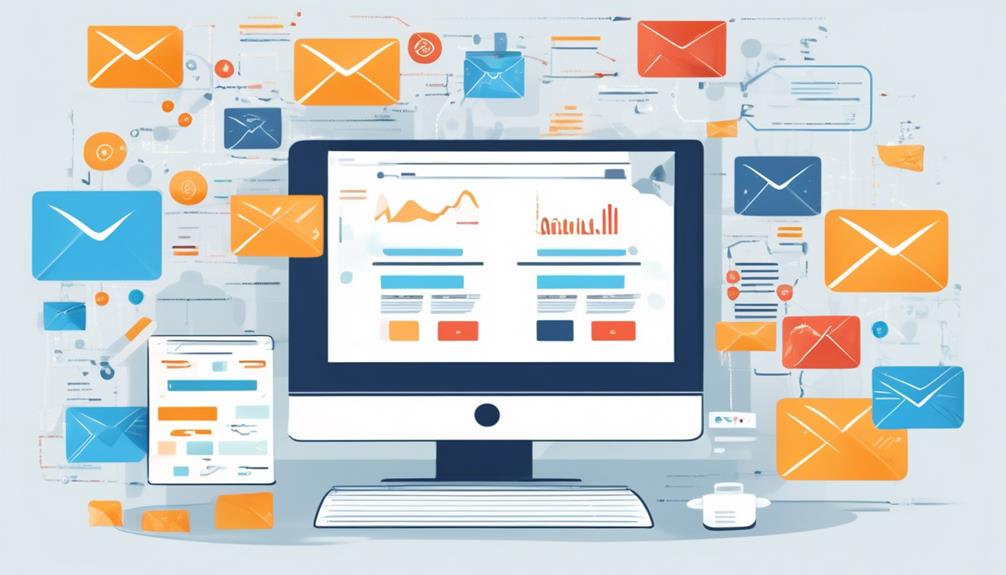In evaluating the various email marketing software choices, deciding on the optimal one continues to be a critical factor for companies regardless of their size.
With a myriad of choices, each offering unique features and functionalities, the decision-making process can be daunting.
However, in our exploration of this topic, we aim to provide a comprehensive analysis that will assist in identifying the most suitable solution for your specific needs.
From scalability and customization to analytics and automation, the right email marketing software can significantly impact the success of your campaigns.
Key Takeaways
- There are several top email marketing software options available, including Mailchimp, Zoho Campaigns, Drip, Constant Contact, GetResponse, and SendinBlue, each with their own unique features and functionalities.
- When choosing email marketing software, it is important to consider customization options, deliverability rates, integration capabilities, user-friendly interfaces, and the ability to send targeted and personalized emails.
- Cost considerations include limitations of free plans, scalability and pricing structure, unlocking advanced features with paid plans, and assessing the most cost-effective solution based on business needs.
- Email marketing remains an effective strategy with a high ROI, especially when incorporating essential features, automation, AI advancements, seamless integration, customization capabilities, and performance tracking.
Top 10 Email Marketing Software Options
We have compiled a list of the top 10 email marketing software options to help you make informed decisions for your marketing needs.
When it comes to devising an effective email marketing strategy, selecting the best platform is crucial. Among the top contenders, Mailchimp stands out as the best all-in-one marketing solution, offering not only email services but also websites, landing pages, social ads, and postcards. Its user-friendly interface and customizable email templates make it a popular choice for businesses.
Zoho Campaigns, on the other hand, is the best for a fully integrated business suite, providing unlimited emails, dynamic content, A/B testing, and being part of the comprehensive suite of cloud software offered by Zoho. It’s particularly favored by India-based companies and is gaining traction in the U.S. market.
Additionally, Drip is the go-to option for e-commerce businesses due to its advanced automation, personalization, segmentation, and customer behavior tracking features. It seamlessly integrates with popular e-commerce platforms, catering to businesses heavily reliant on online sales.
These platforms offer diverse features and cater to different business needs, making them stand out as the best email marketing software options.
Key Factors in Choosing Email Marketing Software

When evaluating email marketing software, it’s essential to consider key factors such as customization options, deliverability rates, and integration capabilities.
A robust email marketing strategy requires software that offers extensive customization options to tailor emails based on audience segments, behaviors, and preferences.
Additionally, the best email marketing platforms prioritize deliverability rates, ensuring that emails reach recipients’ inboxes effectively.
Integration capabilities are crucial for seamless use of the software with other essential tools for small business marketing, such as a landing page builder, CRM, or e-commerce platform.
The best email marketing software should offer a user-friendly interface and advanced features to optimize email marketing campaigns.
Integration with other tools and platforms is vital for efficiently managing and utilizing customer data, automating workflows, and personalizing emails.
Furthermore, the ability to send targeted and personalized emails is fundamental to a successful email marketing strategy.
Considering these factors ensures that the chosen software aligns with the specific needs and goals of the business.
Email Marketing Software Cost Considerations
Considering the key factors in choosing email marketing software, an important aspect to address is the cost considerations associated with different pricing models and features.
When evaluating email marketing software, it’s crucial to weigh the cost implications of various plans. Free plans may be enticing, but they often come with limitations, such as restricted features or a cap on the number of emails that can be sent per month. These constraints could hinder the full potential of your email marketing efforts.
It’s advisable to scrutinize the scalability of the software and its pricing structure, ensuring that it aligns with the business’s growth and needs. Some providers offer a ‘forever free’ plan, while others may provide a free trial of their paid plans. Paid plans typically unlock advanced features like automation, A/B testing, and enhanced customization, catering to the evolving requirements of a growing subscriber base.
Additionally, the pricing models may vary, with some based on the number of contacts or subscribers, and others employing flat-rate pricing regardless of the contact list size.
Assessing these cost considerations is pivotal in determining the most cost-effective and beneficial email marketing solution for your business.
Effectiveness of Email Marketing in 2024

In 2024, email marketing continues to demonstrate its unparalleled effectiveness as a high-ROI marketing strategy for businesses in the United States. It offers a remarkable average return on investment (ROI) of 4400 percent, making it a cost-effective and influential tool for small businesses to directly engage with customers and drive business growth.
The success of email marketing heavily relies on the chosen email marketing software, which now integrates essential features, automation, and AI advancements for omnichannel marketing automation and customer relationship management (CRM). To maximize effectiveness, businesses should seek email marketing solutions that offer easy-to-use interfaces, targeted bulk email capabilities, efficient contact list management, and robust performance tracking.
Incorporating these elements into email marketing campaigns can significantly enhance open rates and audience segmentation, ultimately leading to improved engagement and conversion rates. As digital marketing evolves, the effectiveness of email marketing remains a cornerstone, and leveraging the right email marketing tools is crucial for businesses aiming to achieve optimal results.
Email Marketing Integration and Customization
Email marketing’s effectiveness hinges on the seamless integration and customization capabilities offered by modern email marketing software. When evaluating email marketing tools, it’s crucial to consider the range of integration options available. Look for a platform that allows you to build landing pages to complement your email campaigns, providing a consistent user experience from email to conversion. Advanced features such as full marketing automation, CRM features, and workflow automation are essential for streamlining processes and ensuring a cohesive approach to customer communication.
These tools not only automate your email marketing but also offer the flexibility to tailor communications based on customer behavior and preferences. Customization is key to delivering personalized content and driving engagement. Additionally, robust integration with other marketing and sales tools can enhance the overall effectiveness of your email marketing efforts. By choosing a solution with extensive integration and customization capabilities, you can create a seamless experience for your audience while optimizing your marketing strategy.
Frequently Asked Questions
Which Is the Best Platform for Email Marketing?
We should consider the features and pricing of various platforms before determining the best one for email marketing.
Each platform offers unique benefits and caters to different needs, from all-in-one marketing solutions to e-commerce automation.
Evaluating our specific requirements and budget will guide us in selecting the most suitable platform for our email marketing needs.
What Is the Best Email Marketing Software Which Is Free to Use?
As for the best free email marketing software, we’ve found that Zoho Campaigns offers a robust platform with unlimited emails, dynamic content, and seamless integration with a comprehensive suite of cloud software.
It’s an excellent choice for businesses seeking a fully integrated business suite.
Additionally, Zoho Campaigns provides advanced features and tools that cater to the needs of businesses without the burden of a price tag.
Is Mailchimp the Best for Email Marketing?
Yes, Mailchimp is a top choice for email marketing, offering a comprehensive range of features and a user-friendly platform.
Its all-in-one marketing capabilities make it an attractive option for businesses looking to grow.
With a starting price of free and easy-to-use tools, it’s well-suited for beginners.
However, each business has unique needs, so it’s important to carefully consider which software best aligns with specific goals and strategies.
Is Klaviyo Better Than Mailchimp?
We believe Klaviyo offers advanced automation and personalization, making it a strong contender in the e-commerce marketing sphere. Its powerful segmentation and seamless integration with popular e-commerce platforms are particularly noteworthy.
Klaviyo is a preferred choice for businesses heavily relying on online sales. Its pricing and features position it as a strong competitor to Mailchimp.
Klaviyo’s comprehensive capabilities make it a compelling option for e-commerce businesses seeking advanced marketing solutions.
Conclusion
In conclusion, when it comes to choosing the best email marketing software, it’s important to consider factors such as pricing, features, and target audience.
One interesting statistic to note is that 80% of business professionals believe that email marketing increases customer retention. This highlights the effectiveness of email marketing and the importance of choosing the right software to maximize its impact on your business.










